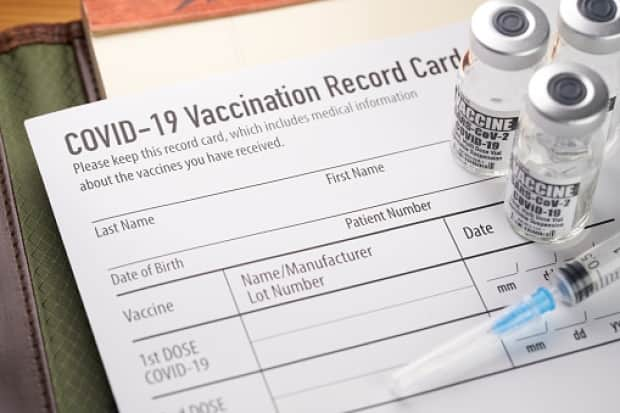Here's what's missing from Canada's pandemic vaccine rollout

The biggest challenge in rolling out coronavirus vaccines to Canadians may be the last leg of the race, medical and logistics experts say.
A successful vaccine rollout hinges on a registry to track who gets the vaccine — and when. And that registry requires something they say Canada doesn't have: a nation-wide electronic medical system.
The federal government is planning to implement country-wide monitoring of vaccine coverage and to track safety and effectiveness, Dr. Theresa Tam, Canada's chief medical officer of health, said Tuesday.
"We are also looking at augmenting the information technology (IT) as it's needed to support this network of different systems at play," Tam said.
The IT system needs to track not only who receives a shot — and for some vaccines when the next dose should go in the arm — but also who experiences any side-effects.
WATCH | Why Canadians could benefit from a dynamic vaccine registry:
Mahesh Nagarajan, a professor at the University of British Columbia's Sauder School of Business, said it's a "monumental task" to build such a system.
"It's called a dynamic vaccine registry, and we don't have one of those in Canada," said Nagarajan, an expert in supply chain and distribution.
Searching for a rare, side-effect signal
Instead, British Columbia, Yukon, Saskatchewan, Manitoba, Ontario, Quebec, New Brunswick and Nova Scotia each have a system for tracking immunizations. But provincial and territorial systems in the IBM-made registry, called Panorama, don't really speak to one another.
Tam said while the clinical trials for vaccine candidates haven't shown any serious side-effects, it's only when the immunizations are rolled out to millions of people worldwide that any rare ones could be spotted.
"If we detect a signal, there would be a rapid response to investigate," Tam said.

The detailed data from provinces and territories needs to feed up to Health Canada so experts can monitor vaccine coverage and safety.
Dr. Jeff Kwong, a senior scientist at the Toronto-based research organization, ICES, found a one-in-a-million risk of a serious condition that can lead to paralysis from influenza vaccination, as well as a much higher risk of the same syndrome from getting the flu itself.
Kwong said the challenges of capturing vaccine data for the coronavirus aren't insurmountable.
He's working with colleagues in several provinces (Ontario, B.C, Alberta, Manitoba and Quebec) to set up a system to monitor those who receive vaccines to protect against COVID-19 based on hospitalization and emergency department data.
"Then we can look to see if individuals who receive the vaccine are more likely to have certain side-effects than others, from the vaccine," Kwong said.
Second stage of vaccinations
Health Canada will also require vaccine makers to provide more surveillance data as a condition of approval, Tam said.
Prashant Yadav, a senior fellow at the Center for Global Development in Washington, works on improving health-care supply chains, including for vaccines. Yadav said he expects the ability to track the first stage of vaccinations of vulnerable seniors and health-care workers will benefit from reaching populations who are already closely monitored.
Paper records could suffice for them at first, he said.
"The real challenges will come when we go to true, mainstream population-level vaccination," Yadav said. "We'll have to resort to mass vaccination clinics, new vaccination sites, retail pharmacies and community pharmacies."
The final path a vaccine takes from a distribution centre to a clinic to a patient's arm involves regulations, supply chains and checks of the cold chain.

Frontline health care professionals who will administer the vaccines will also need to be trained on ensuring the ultra cold chain requirements for the Pfizer-BioNtech vaccine are met, Yadav said.
Dr. Caroline Quach, a paediatric infectious disease physician and medical microbiologist at Sainte-Justine Hospital in Montreal, said surveillance for any potential adverse events following immunization is a necessary basis to ensure people's trust.
"If we have a vaccine but it doesn't get administered either because we can't get it to people's arms or because arms are not showing up, we're not any further ahead of ourselves and so the scientific crisis will continue," Quach said.

